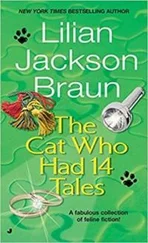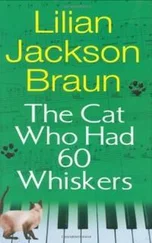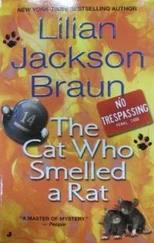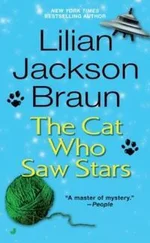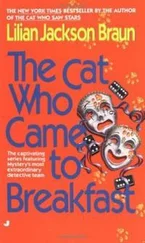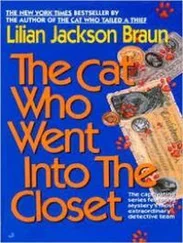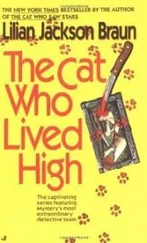Arriving at a low platform near the bandstand and the birthday cake, the mayor accepted a microphone and declared that the historic town of Brrr had reached its two-hundredth year. Miss Agatha pressed a button, and the two hundred electric candles on the wooden cake were dazzling in the approaching dusk.
After that there were refreshments in the hotel and some serious marmalade tasting . . . entertainment in the park . . . conversation among Scots . . .
Lisa and Lyle Compton were there. (She was a Campbell—her husband a Ross.) Polly said they looked splendid in tartans. Lyle applauded the “Qwill Pen” column on Miss Agatha Burns. Qwilleran asked, “Lyle, are you both attending the dedication of the Carroll Memorial Museum Sunday afternoon?” He said they wouldn’t miss it for anything! Lisa said that Edythe would turn over the keys to Mount Vernon, and someone would give her an armful of roses. Then they discussed the Marmalade Madness and the merits of each. Polly said the bookstore was getting a marmalade mascot named Dundee.
When Qwilleran drove Polly back to Indian Village, he declined her invitation to come in for some music.
Polly said with a sigh, “I should really bear down on my studying. I’m learning some amazing facts. Do you realize that a bookstore grossing fifty thousand dollars will need one-point-eight persons on the staff?”
“Where do you get eight-tenths of a person?” Qwilleran said. “I feel that way myself sometimes, but I wouldn’t admit it to a prospective employer.”
Polly, who had become an expert at ignoring his levity, went on: “What do you think about having the cashier and service counter on the left as one enters? They say traffic flows in normally to the right and continues out on the other side.”
“Will Dundee have a location of his own? Or will he be free to wander at will?”
“That topic hasn’t been covered in my manual,” Polly said. “Mac and Katie at the library have simply adopted the circulation desk as their headquarters.”
After taking Polly home, Qwilleran drove back to Pickax faster than usual, as if a strange force was pulling him back to the barn. He had felt it before, when the cats had needed him.
The answer was waiting for him in the barnyard: a station wagon with a Wisconsin tag. But there were no cats waiting in the window. They were in hiding. The trespassers were probably in the gazebo.
Qwilleran grabbed a high-powered flashlight from his car and walked stealthily around to the front of the barn before switching it on.
Shocked and blinded by the sudden light, Lish and Lush jumped to their feet.
“Aren’t you people at the wrong address?” Qwilleran thundered. They had been drinking beer and eating take-out food.
“I’m sorry, Mr. Qwilleran. I couldn’t find a phone number for you. This is Clarence, my driver. I can’t have a license. Health problem, you know.”
Clarence gave a dopey nod, and Qwilleran responded accordingly.
Lish went on with characteristic nerve. “Do you happen to have a guest room we could use? All the accommodations are booked solid.”
Qwilleran said, “I have only one guest room, and that is occupied by a friend from California—a police investigator, here to work on a case.” He saw an involuntary glance pass between the two. “However, there are plenty of campsites where you can sleep in your car and use camp facilities. The best is Great Oaks. I’ll tell you how to get there. Have you brought a report on the matter I discussed with you?”
“No, but I have notes and can tell you the whole story.”
“Then excuse me a moment while I feed the cats.”
The Siamese had been fed earlier, but it was a chance to pick up his pocket tape recorder and a checkbook.
Back in the gazebo he said, “Okay, sit down and let’s hear it.”
“It ended up taking a lot more time than I expected, but I was on the trail of something important, so I persevered.
“First I checked the phone book, as you suggested, and there was no Mountclemens or Bonifield listed. So I thought of going to the courthouse. There were records in several different departments that might give a clue, and I spent a couple of days there. Then I had some vital business to take care of, so I turned the search over to one of the clerks. She was very nice, and eager to help. I told her to keep a record of hours spent and she’d be reimbursed.
“Well, it paid off! When I went back, she was all excited, saying it made her feel like a detective. There was no Mountclemens, but there was a Monty Clemens, who was the son of a George Clemens, and his mother had been Bonnie Field before her marriage. Monty was an artist who became an art critic somewhere out of town. He could have changed his name to George Bonifield Mountclemens, to sound more important than Monty Clemens.
“George was dead, but Bonnie was living in a nursing home in the suburbs, and I found her there. When she said she’d been a cat breeder, I felt as if we’d struck gold! She raised Persians.
“Well, George went to Southeast Asia during the Vietnam War, and when it was over, he got a traveling job doing business in Bangkok. He went back and forth several times a year and told his wife about the gorgeous cats they had there. What’s more, they kept records of their heritage, tracing some of them back to the days when Thailand was called Siam, and the cats were bred as watch cats in the royal courts. They were known to be highly intelligent, and some had traits that were positively supernatural! The super cats weren’t usually sold to foreigners, but George knew the right people and had done favors for people, so they agreed to sell him a pedigreed male.
“When he phoned Bonnie, she was thrilled and told him she needed a breeding pair. So he pulled some more strings and got a female. They were very expensive, she said. Next problem: how to get them into the U.S. without the quarantine. George pulled some more strings, and the pair crossed the Pacific on an Air Force jet, probably howling all the way, Bonnie said with a laugh.
“So your cat is descended from this original breeding pair. Bonnie stopped breeding Persians and concentrated on Siamese. She did very well. All her customers reported that their cats had ESP.”
“Very interesting, Lish,” Qwilleran said. “How much do I owe you?”
“Well, it was a lot of fun, and I’d love to do it for nothing, Mr. Qwilleran, but there were a lot of expenses: travel cost and remuneration to the courthouse clerk and Bonnie Field. I thought you’d want me to be generous. The clerk spent a lot of hours, and Bonnie really needed the money. She said there are no retirement benefits for cat breeders. And I spent a total of nineteen hours myself, including travel time. So I think a thousand would be fair, less the fifty that you gave me in advance.”
“I’ll write you a check.”
“Could you possibly make it cash? It’s hard to get a large check cashed when you’re on the road, the way I am.”
“I . . . well . . . how would it be if I make the check payable to cash, and I’ll tell Gary Pratt at the Hotel Booze to cash it for you. Hotels always have money in the safe.”
Qwilleran clicked off the recorder surreptitiously, thanked Lish for her conscientious work, wrote her a check, and stood up briskly, signifying: end of interview.
She kicked her driver’s ankle (he had dozed off) and said she would be happy to undertake other assignments in the future.
“Where can I reach you in Milwaukee?” Qwilleran asked.
“Well, I’m in the process of relocating, and I’m not sure where. I’ll get back to you.”
“Do that!” he said. “Now, I’ll give you directions for reaching the Great Oaks camp.”
He watched their taillights receding through the woods before going indoors to brew a cup of coffee and contemplate the whole fabricated farce.
Читать дальше

